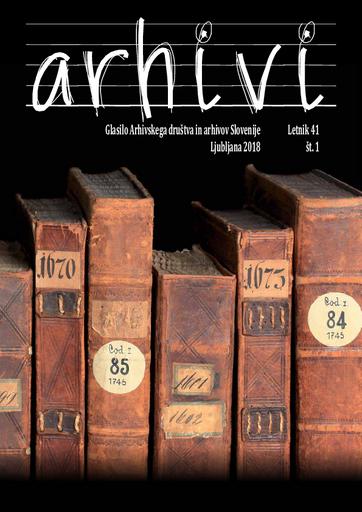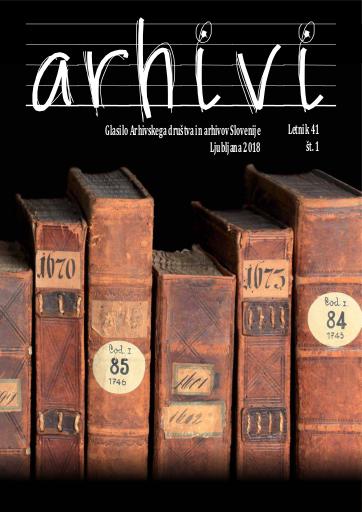
/
Serijske publikacije
/
Arhivi
Spolne bolezni v Mariboru in okolici na podlagi matičnih knjig splošne bolnišnice Maribor v času med obema vojnama

Avtor(ji):Gordana Šövegeš Lipovšek
Soavtor(ji):Gregor Jenuš (gl. in odg. ur.), Marija Grabnar (ur.), Dunja Mušič (teh. ur.), Petra Markuš (prev.), Marija Grabnar, Andreja Klasinc Škofljanec in Borut Jurca (foto.)
Leto:2018
Založnik(i):Arhivsko društvo Slovenije, Ljubljana
Vir(i):Arhivi, 2018, št. 1
Jezik(i):slovenščina
Vrst(e) gradiva:besedilo
Ključne besede:IZ ARHIVSKIH FONDOV IN ZBIRK, ZAGOPP, Splošna bolnišnica Maribor, zdravstvena dokumentacija, ambulanta in Oddelek za spolne in kožne bolezni, FROM THE ARCHIVAL FILES AND COLLECTIONS, Act Regulating Archival Material Containing Personal Data from Medical Records, Maribor General Hospital, medical records, ambulatory care clinic, Department of skin and venereal diseases
Avtorske pravice:

To delo avtorja Gordana Šövegeš Lipovšek je ponujeno pod Creative Commons Priznanje avtorstva-Nekomercialno-Deljenje pod enakimi pogoji 4.0 Mednarodna
Datoteke (1)

Ime:ARHIVI_2018-1.pdf
Velikost:12.28MB
Format:application/pdf
Stalna povezava:https://hdl.handle.net/11686/file25398
Opis
V gradivu fonda Splošne bolnišnice Maribor je poleg upravne dokumentacije tudi veliko zdravstvene dokumentacije, na podlagi katere se lahko izdelajo najrazličnejše raziskave o zdravstvu ljudi v preteklosti. Prispevek želi prikazati primer raziskave po arhivskem gradivu, ki vsebuje osebne podatke o zdravljenju pacienta ter zakonske ovire, na katere lahko naleti zgodovinar oz. raziskovalec, ki se loti tovrstnega raziskovanja.
Metapodatki (12)
- identifikatorhttps://hdl.handle.net/11686/41592
- naslov
- Spolne bolezni v Mariboru in okolici na podlagi matičnih knjig splošne bolnišnice Maribor v času med obema vojnama
- Venereal Diseases in Maribor and its Outskirts on the Basis of Civil Registers of Maribor General Hospital During the Inter-war Period
- avtor
- Gordana Šövegeš Lipovšek
- soavtor
- Gregor Jenuš (gl. in odg. ur.)
- Marija Grabnar (ur.)
- Dunja Mušič (teh. ur.)
- Petra Markuš (prev.)
- Marija Grabnar, Andreja Klasinc Škofljanec in Borut Jurca (foto.)
- predmet
- IZ ARHIVSKIH FONDOV IN ZBIRK
- ZAGOPP
- Splošna bolnišnica Maribor
- zdravstvena dokumentacija
- ambulanta in Oddelek za spolne in kožne bolezni
- FROM THE ARCHIVAL FILES AND COLLECTIONS
- Act Regulating Archival Material Containing Personal Data from Medical Records
- Maribor General Hospital
- medical records
- ambulatory care clinic
- Department of skin and venereal diseases
- opis
- Maribor General Hospital fond kept in Regional Archives Maribor comprises of more than 60% of medical records. Up until the introduction of Act Regulating Archival Material Containing Personal Data from Medical Records, researching archival material containing personal data on patient’s medical treatment was relatively simple. Researching such material was possible on the basis of Articles 65 and 66 of the Protection of Documents and Archives and Archival Institutions Act. With the adoption of the Act Regulating Archival Material Containing Personal Data from Medical Records, access to medical records is either no longer possible or became very difficult. Given that medical records of the Maribor General Hospital are civil registers in which several hundred patients are registered, it is impossible to seek them out or obtain their agreement or their relatives’ agreement, similarly, anonymisation of this material is almost impossible. In the article, only one research example is shown, namely venereal and skin diseases in Maribor in 1932 on the basis of sex, age, and type of disease. The research was especially focused on men. It was determined that in 1932 the clinic was visited by 873 persons, 60% of whom were men (522). Approximately 65% of them (336) were single or unmarried and aged over 15 years. Almost 40% suffered from gonorrhoea, and a significant portion suffered from syphilis (almost 20%). It would be interesting to explore profiles of men who had a disease: were they workers, traders, soldiers, tradesmen, employees, students, farmers or did they have another profession or no profession. Similar research could be conducted on the basis of civil registers of any other hospital department, for instance gynaecology and obstetrics department, traumatology department, emergency department etc. Because most of these civil registers on the basis of which various medical and also social research on the people of Maribor and those living in the outskirts of Maribor could be conducted are preceding 1945, it would be a shame if commissions would restrict access to that material as this kind of research was not carried out in the past. Therefore, it will be interesting to follow decisions of archives commission and committee responsible for medical and ethical issues in the access to this material.
- založnik
- Arhivsko društvo Slovenije
- datum
- 2018
- 01. 01. 2018
- tip
- besedilo
- jezik
- Slovenščina
- jeDelOd
- pravice
- licenca: ccByNcSa